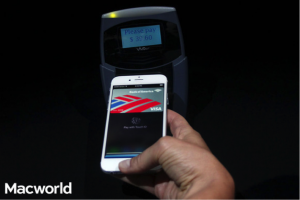By: Samantha Keefe
Earlier this week Apple unveiled its new app “Apple Pay.” With just a tap of the thumb, some iPhone users are now able to pay for many in-store purchases using their smart phones. With just a simple download of the iOS 8.1 software, those who have the new iPhone 6 or iPhone 6 Plus now have access to the new app. Many retailers are accepting the app as a method of payment, including McDonald’s, Macy’s, Walgreens, Home Depot, and Whole Foods.
Apple has recently faced a lot of criticism lately, first, over the iCloud scandal, where hackers broke into celebrities personal accounts and leaked nude photos that were contained in the accounts. Then, as the new iPhones were released, there were reports that some of the new phones were bending when slid into users back pockets. This new app may leave many skeptical that Apple is able to provide adequate security to protect their credit card accounts. If they can’t protect your pictures and personal information, how can they protect your money?
Apple does have one big thing going for them; they are way ahead of the game in unveiling this new app. Unlike Google Wallet, another electronic paying method, Apple requires a fingerprint of the iPhone owner, and the fingerprint must be scanned each time a purchase is made. This seems to be an adequate security measure on Apple’s end, but what about the banks consumers use to make these purchases? Or the stores they make these purchases at? It seems not so much.
The big question remaining is who becomes liable if Apple Pay becomes vulnerable to hackers accessing credit card information, or errors on behalf of the banks that customers use the app? Earlier this week double charges appeared on Bank of America customers statements after using Apple Pay. When confronted, each company seemed to blame the other; a report from CNN Money (http://money.cnn.com/2014/10/22/technology/mobile/apple-pay-double-charge/) revealed that users who had been double charged called Bank of America, who told customers the errors were made on Apple’s behalf, when calling Apple, they stated, only BOA could fix the error. Both companies have apologized for the apparent glitches, but more security infractions could occur for Apple Pay users.
Just last month, Home Depot, one retailer accepting the new method of payment, revealed that thousands of credit card numbers had been compromised by a hacker. The retailer warned their customers that their information could potentially be in the hands of identity thieves. Although Apple was not involved in this scandal, they are allowing users of the app to make purchases at stores that do not have stellar security records when involving their customers. Apple should have extra precautions concerning the retailers they allow the use of Apple Pay. All of this technology is very new, and could potentially leave users at a higher risk when using the app.
So, the verdict on Apple Pay? For now I’d say it is best to wait it out. Apple is clearly one of the most inventive companies today, if the not the most inventive. They are able to connect high technology that the average person can use with ease. But, unfortunately, Apple, like most of us is not perfect. Recent security lapses involving their iCloud scandal and unfortunate Apple Pay rollout for Bank of America customers leaves room for consumers to be skeptical about their security with Apple. Paying for purchases with our cell phones sounds pretty awesome, but there are too many questions surrounding the technology, and who is responsible when the technology doesn’t work.
Bio: Samantha is a Staff Member of the Journal of High Technology Law. She is currently a 2L at Suffolk University Law School. She holds a B.S. in Government and Philosophy from Suffolk University. She enjoys politics and tea.


You must be logged in to post a comment.